
Go to the source code of this file.
Data Structures | |
| struct | native_event_info |
Macros | |
| #define | NATIVE_EVENT_CHUNKSIZE 1024 |
Variables | |
| int | init_level = PAPI_NOT_INITED |
| int | _papi_hwi_error_level = PAPI_QUIET |
| PAPI_debug_handler_t | _papi_hwi_debug_handler = default_debug_handler |
| papi_mdi_t | _papi_hwi_system_info |
| int | _papi_hwi_errno = PAPI_OK |
| int | _papi_hwi_num_errors = 0 |
| hwi_presets_t | user_defined_events [PAPI_MAX_USER_EVENTS] |
| int | user_defined_events_count = 0 |
| THREAD_LOCAL_STORAGE_KEYWORD int | _papi_rate_events_running = 0 |
| THREAD_LOCAL_STORAGE_KEYWORD int | _papi_hl_events_running = 0 |
| static struct native_event_info * | _papi_native_events =NULL |
| static int | num_native_events =0 |
| static int | num_native_chunks =0 |
| char ** | _papi_errlist = NULL |
| static int | num_error_chunks = 0 |
| char * | papi_event_string = NULL |
| int | papi_num_components = ( sizeof ( _papi_hwd ) / sizeof ( *_papi_hwd ) ) - 1 |
| static const hwi_describe_t | _papi_hwi_derived [] |
Macro Definition Documentation
◆ NATIVE_EVENT_CHUNKSIZE
| #define NATIVE_EVENT_CHUNKSIZE 1024 |
Definition at line 69 of file papi_internal.c.
Function Documentation
◆ _papi_hwi_add_error()
|
static |
Definition at line 393 of file papi_internal.c.

◆ _papi_hwi_add_event()
| int _papi_hwi_add_event | ( | EventSetInfo_t * | ESI, |
| int | EventCode | ||
| ) |
Definition at line 1337 of file papi_internal.c.


◆ _papi_hwi_add_native_event()
|
static |
Definition at line 348 of file papi_internal.c.


◆ _papi_hwi_assign_eventset()
| int _papi_hwi_assign_eventset | ( | EventSetInfo_t * | ESI, |
| int | cidx | ||
| ) |
Definition at line 762 of file papi_internal.c.


◆ _papi_hwi_cleanup_errors()
|
static |
Definition at line 420 of file papi_internal.c.


◆ _papi_hwi_cleanup_eventset()
| int _papi_hwi_cleanup_eventset | ( | EventSetInfo_t * | ESI | ) |
Definition at line 1758 of file papi_internal.c.


◆ _papi_hwi_component_index()
Definition at line 522 of file papi_internal.c.
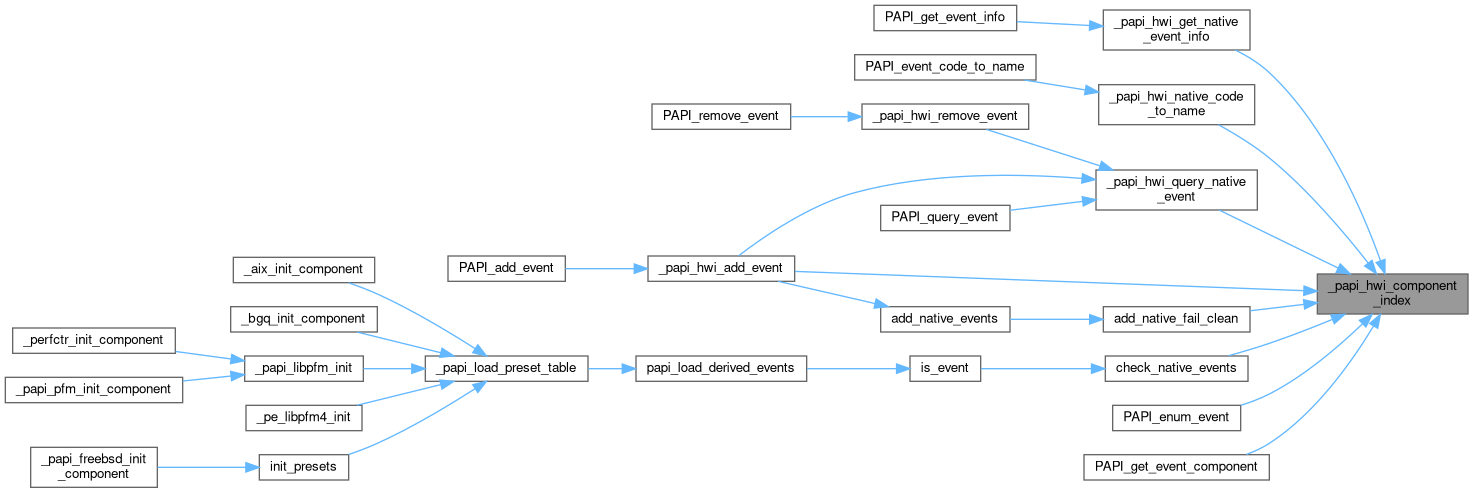
◆ _papi_hwi_convert_eventset_to_multiplex()
| int _papi_hwi_convert_eventset_to_multiplex | ( | _papi_int_multiplex_t * | mpx | ) |
Definition at line 1870 of file papi_internal.c.


◆ _papi_hwi_create_eventset()
| int _papi_hwi_create_eventset | ( | int * | EventSet, |
| ThreadInfo_t * | handle | ||
| ) |
Definition at line 939 of file papi_internal.c.


◆ _papi_hwi_derived_string()
Definition at line 2268 of file papi_internal.c.

◆ _papi_hwi_derived_type()
Definition at line 2247 of file papi_internal.c.

◆ _papi_hwi_dummy_handler()
| void _papi_hwi_dummy_handler | ( | int | EventSet, |
| void * | address, | ||
| long long | overflow_vector, | ||
| void * | context | ||
| ) |
Definition at line 2041 of file papi_internal.c.

◆ _papi_hwi_enum_dev_type()
Definition at line 2758 of file papi_internal.c.


◆ _papi_hwi_eventcode_to_native()
Definition at line 583 of file papi_internal.c.

◆ _papi_hwi_find_native_event()
Definition at line 314 of file papi_internal.c.


◆ _papi_hwi_free_EventSet()
| void _papi_hwi_free_EventSet | ( | EventSetInfo_t * | ESI | ) |
Definition at line 894 of file papi_internal.c.

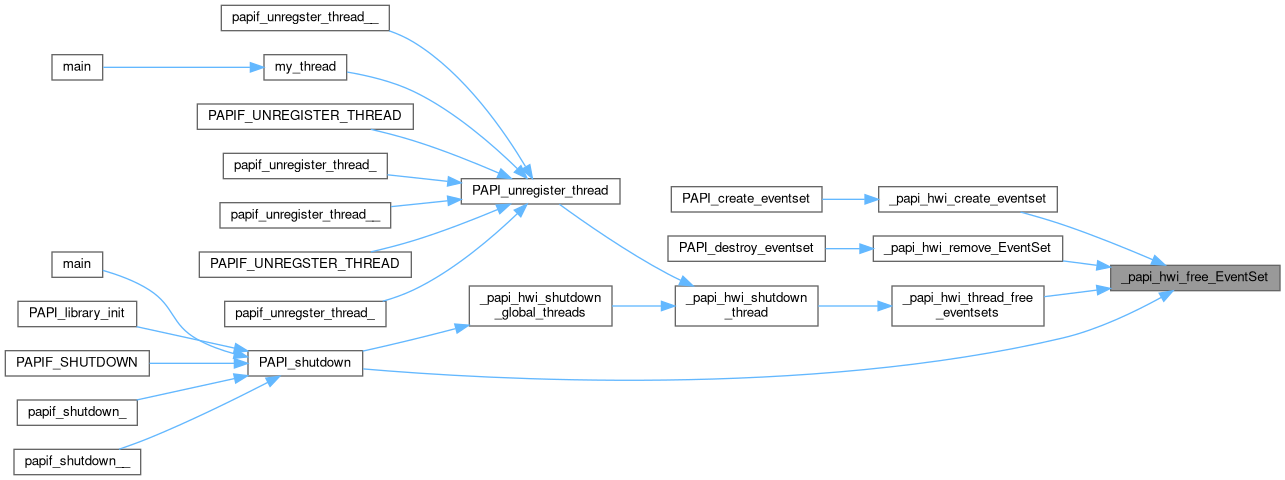
◆ _papi_hwi_free_papi_event_string()
| void _papi_hwi_free_papi_event_string | ( | ) |
Definition at line 110 of file papi_internal.c.

◆ _papi_hwi_get_context()
| hwd_context_t * _papi_hwi_get_context | ( | EventSetInfo_t * | ESI, |
| int * | is_dirty | ||
| ) |
Definition at line 2702 of file papi_internal.c.

◆ _papi_hwi_get_dev_attr()
| int _papi_hwi_get_dev_attr | ( | void * | handle, |
| int | id, | ||
| PAPI_dev_attr_e | attr, | ||
| void * | value | ||
| ) |
Definition at line 2785 of file papi_internal.c.


◆ _papi_hwi_get_dev_type_attr()
| int _papi_hwi_get_dev_type_attr | ( | void * | handle, |
| PAPI_dev_type_attr_e | attr, | ||
| void * | value | ||
| ) |
Definition at line 2771 of file papi_internal.c.


◆ _papi_hwi_get_native_event_info()
| int _papi_hwi_get_native_event_info | ( | unsigned int | EventCode, |
| PAPI_event_info_t * | info | ||
| ) |
Definition at line 2583 of file papi_internal.c.


◆ _papi_hwi_get_ntv_idx()
Definition at line 142 of file papi_internal.c.

◆ _papi_hwi_get_papi_event_code()
| unsigned int _papi_hwi_get_papi_event_code | ( | void | ) |
Definition at line 136 of file papi_internal.c.

◆ _papi_hwi_get_papi_event_string()
| char * _papi_hwi_get_papi_event_string | ( | void | ) |
◆ _papi_hwi_get_preset_event_info()
| int _papi_hwi_get_preset_event_info | ( | int | EventCode, |
| PAPI_event_info_t * | info | ||
| ) |
Definition at line 2291 of file papi_internal.c.


◆ _papi_hwi_get_user_event_info()
| int _papi_hwi_get_user_event_info | ( | int | EventCode, |
| PAPI_event_info_t * | info | ||
| ) |
Definition at line 2351 of file papi_internal.c.


◆ _papi_hwi_init_errors()
| void _papi_hwi_init_errors | ( | void | ) |
Definition at line 482 of file papi_internal.c.

◆ _papi_hwi_init_global()
Definition at line 1938 of file papi_internal.c.


◆ _papi_hwi_init_global_internal()
| int _papi_hwi_init_global_internal | ( | void | ) |
Definition at line 1982 of file papi_internal.c.


◆ _papi_hwi_invalid_cmp()
◆ _papi_hwi_is_sw_multiplex()
| int _papi_hwi_is_sw_multiplex | ( | EventSetInfo_t * | ESI | ) |
Definition at line 2678 of file papi_internal.c.
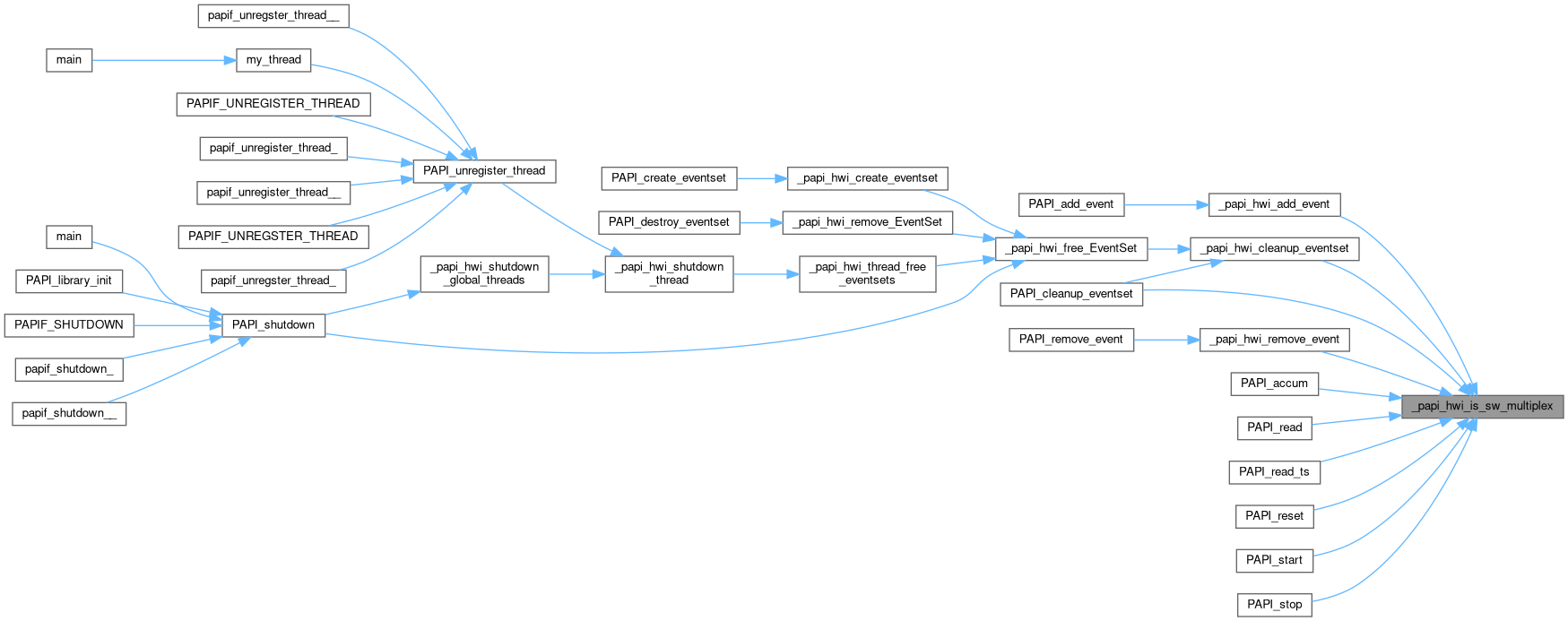
◆ _papi_hwi_lookup_error()
|
static |
Definition at line 444 of file papi_internal.c.

◆ _papi_hwi_lookup_EventCodeIndex()
| int _papi_hwi_lookup_EventCodeIndex | ( | const EventSetInfo_t * | ESI, |
| unsigned int | EventCode | ||
| ) |
Definition at line 1007 of file papi_internal.c.


◆ _papi_hwi_lookup_EventSet()
| EventSetInfo_t * _papi_hwi_lookup_EventSet | ( | int | eventset | ) |
Definition at line 2659 of file papi_internal.c.

◆ _papi_hwi_map_events_to_native()
| void _papi_hwi_map_events_to_native | ( | EventSetInfo_t * | ESI | ) |
Definition at line 1087 of file papi_internal.c.


◆ _papi_hwi_native_code_to_name()
Definition at line 2545 of file papi_internal.c.
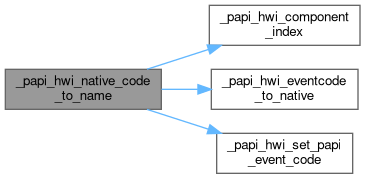

◆ _papi_hwi_native_name_to_code()
Definition at line 2443 of file papi_internal.c.


◆ _papi_hwi_native_to_eventcode()
| int _papi_hwi_native_to_eventcode | ( | int | cidx, |
| int | event_code, | ||
| int | ntv_idx, | ||
| const char * | event_name | ||
| ) |
Definition at line 560 of file papi_internal.c.
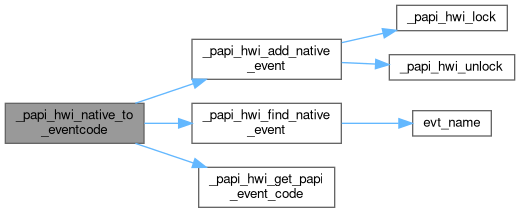

◆ _papi_hwi_postfix_calc()
|
static |
Definition at line 2115 of file papi_internal.c.

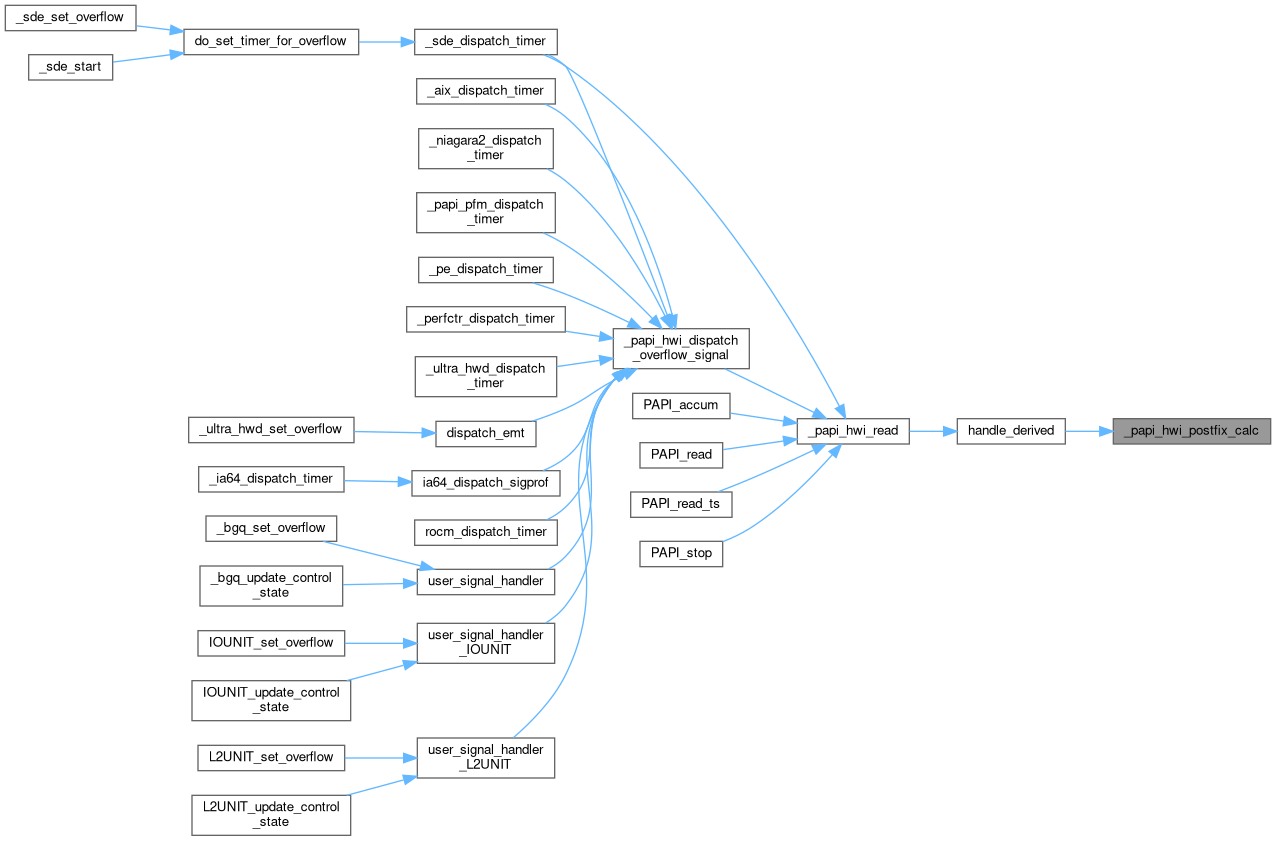
◆ _papi_hwi_prefix_component_name()
| int _papi_hwi_prefix_component_name | ( | char * | component_name, |
| char * | event_name, | ||
| char * | out, | ||
| int | out_len | ||
| ) |
Definition at line 244 of file papi_internal.c.
◆ _papi_hwi_publish_error()
| int _papi_hwi_publish_error | ( | char * | error | ) |
Definition at line 466 of file papi_internal.c.

◆ _papi_hwi_query_native_event()
Definition at line 2412 of file papi_internal.c.


◆ _papi_hwi_read()
| int _papi_hwi_read | ( | hwd_context_t * | context, |
| EventSetInfo_t * | ESI, | ||
| long long * | values | ||
| ) |
Definition at line 1705 of file papi_internal.c.
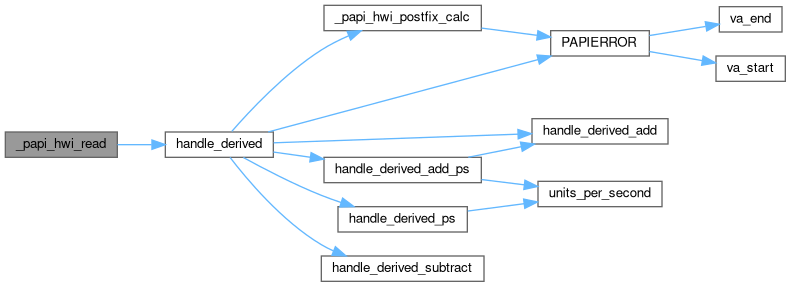

◆ _papi_hwi_remove_event()
| int _papi_hwi_remove_event | ( | EventSetInfo_t * | ESI, |
| int | EventCode | ||
| ) |
Definition at line 1622 of file papi_internal.c.
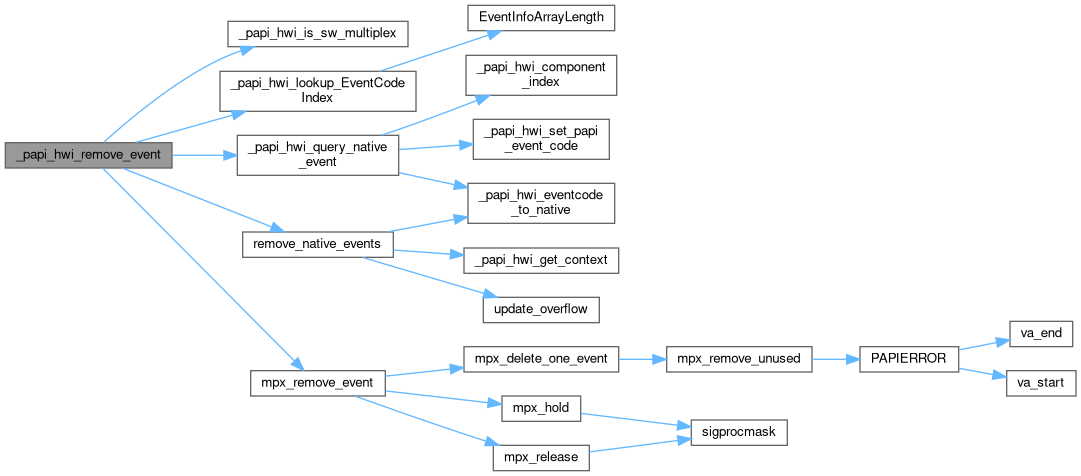

◆ _papi_hwi_remove_EventSet()
| int _papi_hwi_remove_EventSet | ( | EventSetInfo_t * | ESI | ) |
Definition at line 1025 of file papi_internal.c.


◆ _papi_hwi_set_papi_event_code()
Definition at line 119 of file papi_internal.c.

◆ _papi_hwi_set_papi_event_string()
| void _papi_hwi_set_papi_event_string | ( | const char * | event_string | ) |
Definition at line 93 of file papi_internal.c.

◆ _papi_hwi_shutdown_global_internal()
| void _papi_hwi_shutdown_global_internal | ( | void | ) |
Definition at line 2005 of file papi_internal.c.
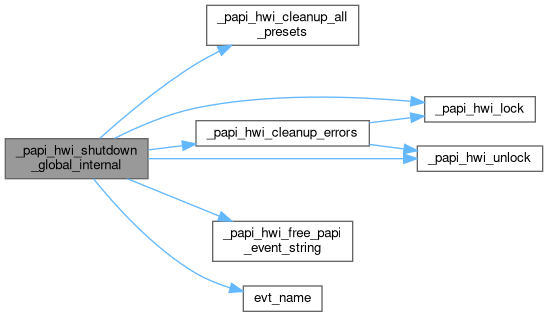

◆ _papi_hwi_strip_component_prefix()
| const char * _papi_hwi_strip_component_prefix | ( | const char * | event_name | ) |
Definition at line 295 of file papi_internal.c.
◆ add_EventSet()
|
static |
Definition at line 906 of file papi_internal.c.


◆ add_native_events()
|
static |
Definition at line 1234 of file papi_internal.c.
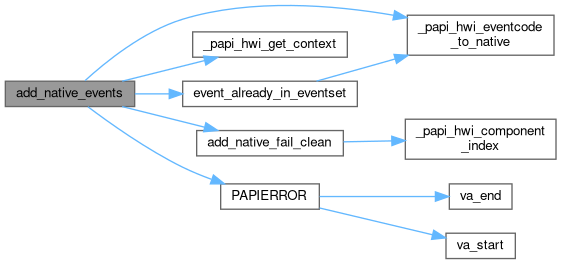

◆ add_native_fail_clean()
|
static |
Definition at line 1170 of file papi_internal.c.


◆ allocate_eventset_map()
|
static |
Definition at line 675 of file papi_internal.c.

◆ create_EventSet()
|
static |
Definition at line 747 of file papi_internal.c.

◆ default_debug_handler()
Definition at line 636 of file papi_internal.c.

◆ event_already_in_eventset()
|
static |
Definition at line 1053 of file papi_internal.c.


◆ EventInfoArrayLength()
|
static |
◆ expand_dynamic_array()
|
static |
Definition at line 700 of file papi_internal.c.

◆ get_component_index()
|
static |
◆ get_free_EventCodeIndex()
|
static |
Definition at line 982 of file papi_internal.c.


◆ handle_derived()
|
static |
Definition at line 2195 of file papi_internal.c.

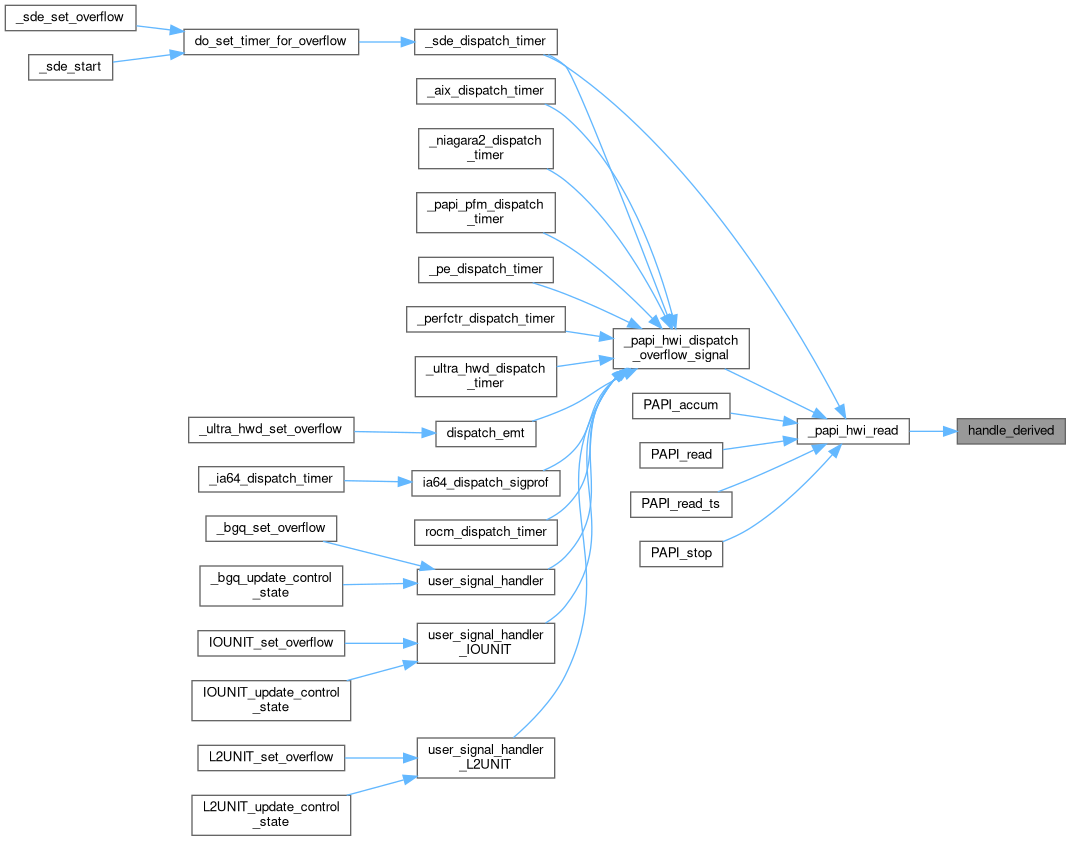
◆ handle_derived_add()
Definition at line 2053 of file papi_internal.c.

◆ handle_derived_add_ps()
Definition at line 2100 of file papi_internal.c.

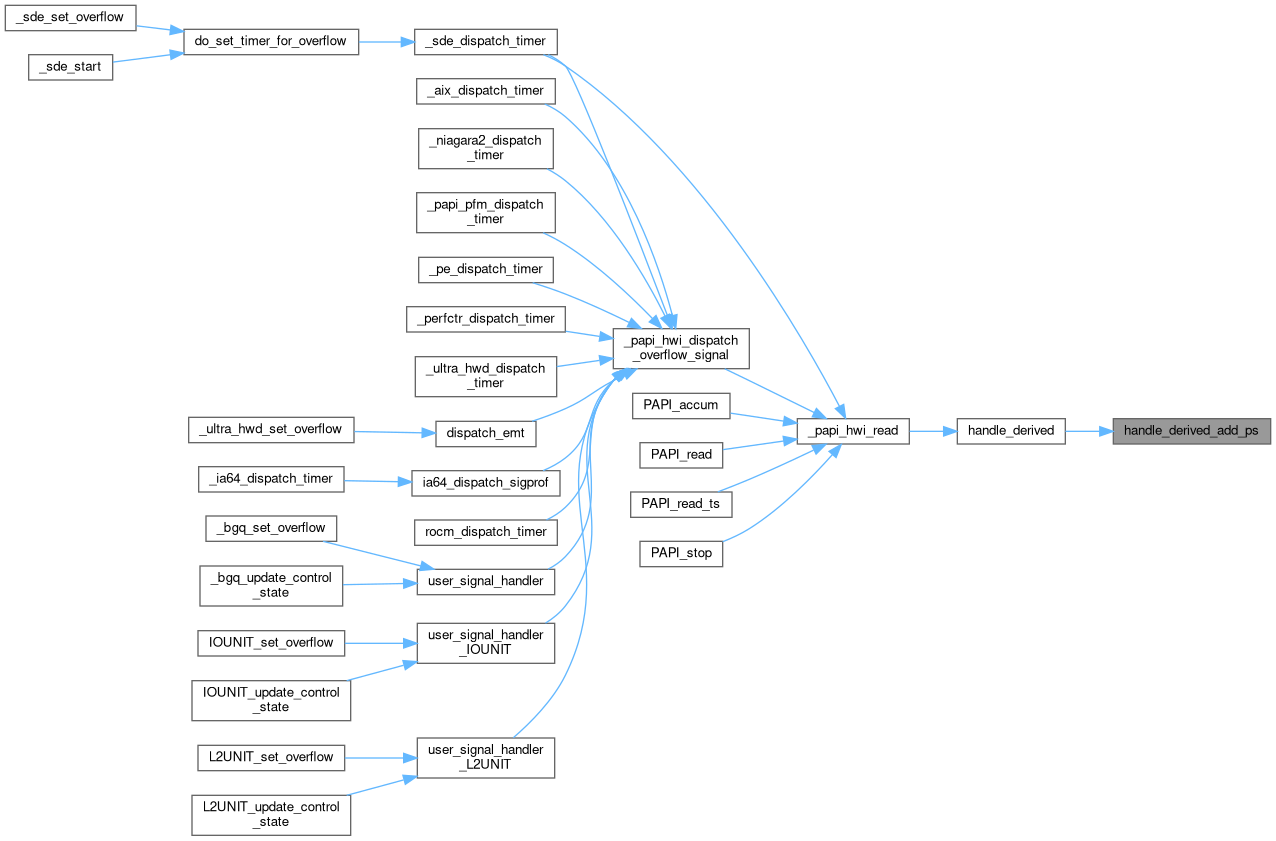
◆ handle_derived_ps()
Definition at line 2095 of file papi_internal.c.


◆ handle_derived_subtract()
◆ is_supported_by_component()
Definition at line 173 of file papi_internal.c.

◆ PAPIERROR()
| void PAPIERROR | ( | char * | format, |
| ... | |||
| ) |
◆ PAPIWARN()
| void PAPIWARN | ( | char * | format, |
| ... | |||
| ) |
◆ remove_native_events()
|
static |
Definition at line 1537 of file papi_internal.c.
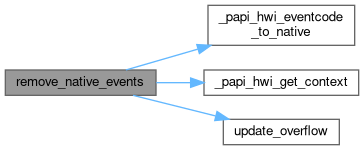

◆ units_per_second()
Definition at line 2088 of file papi_internal.c.

◆ update_overflow()
|
static |
Definition at line 1206 of file papi_internal.c.

Variable Documentation
◆ _papi_errlist
| char** _papi_errlist = NULL |
Definition at line 84 of file papi_internal.c.
◆ _papi_hl_events_running
| THREAD_LOCAL_STORAGE_KEYWORD int _papi_hl_events_running = 0 |
Definition at line 63 of file papi_internal.c.
◆ _papi_hwi_debug_handler
| PAPI_debug_handler_t _papi_hwi_debug_handler = default_debug_handler |
Definition at line 55 of file papi_internal.c.
◆ _papi_hwi_derived
|
static |
Definition at line 2225 of file papi_internal.c.
◆ _papi_hwi_errno
Definition at line 57 of file papi_internal.c.
◆ _papi_hwi_error_level
| int _papi_hwi_error_level = PAPI_QUIET |
Definition at line 54 of file papi_internal.c.
◆ _papi_hwi_num_errors
| int _papi_hwi_num_errors = 0 |
Definition at line 58 of file papi_internal.c.
◆ _papi_hwi_system_info
| papi_mdi_t _papi_hwi_system_info |
Definition at line 56 of file papi_internal.c.
◆ _papi_native_events
|
static |
Definition at line 80 of file papi_internal.c.
◆ _papi_rate_events_running
| THREAD_LOCAL_STORAGE_KEYWORD int _papi_rate_events_running = 0 |
Definition at line 62 of file papi_internal.c.
◆ init_level
| int init_level = PAPI_NOT_INITED |
Definition at line 53 of file papi_internal.c.
◆ num_error_chunks
|
static |
Definition at line 85 of file papi_internal.c.
◆ num_native_chunks
|
static |
Definition at line 82 of file papi_internal.c.
◆ num_native_events
|
static |
Definition at line 81 of file papi_internal.c.
◆ papi_event_string
| char* papi_event_string = NULL |
Definition at line 91 of file papi_internal.c.
◆ papi_num_components
Definition at line 1928 of file papi_internal.c.
◆ user_defined_events
| hwi_presets_t user_defined_events[PAPI_MAX_USER_EVENTS] |
Definition at line 59 of file papi_internal.c.
◆ user_defined_events_count
| int user_defined_events_count = 0 |
Definition at line 60 of file papi_internal.c.







